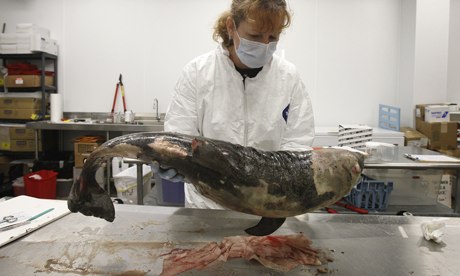Above photo: AP PHOTO/ DERICK E. HINGLE A dolphin rises up out of the water off the coast near Grand Terre Island off the coast of Louisiana on Monday, June 14, 2010. Oil from the Deepwater Horizon spill continues to impact areas across the coast of gulf states.
US government scientists have for the first time found direct evidence of toxic exposure in the Gulf of Mexico
US government scientists have for the first time connected the BP oildisaster to dolphin deaths in the Gulf of Mexico, in a study finding direct evidence of toxic exposure.
The study, led by scientists from the National Oceanic and Atmospheric Administration, found lung disease, hormonal abnormalities and other health effects among dolphins in an area heavily oiled during the BP spill.
 [Photo: An Institute for Marine Mammal Studies veterinary technician examines a dead bottlenose dolphin that was found on Ono Island. Photograph: Patrick Semansky/AP]
[Photo: An Institute for Marine Mammal Studies veterinary technician examines a dead bottlenose dolphin that was found on Ono Island. Photograph: Patrick Semansky/AP]
The diseases found in the dolphins at Barataria Bay in Louisiana – though rare – were consistent with exposure to oil, the scientists said.
“Many disease conditions observed in Barataria Bay dolphins are uncommon but consistent with petroleum hydrocarbon exposure and toxicity,” the scientists said.
Half of the dolphins were given a guarded prognosis, and 17% were expected to die of the disease, the researchers found.
“I’ve never seen such a high prevalence of very sick animals – and with unusual conditions such as the adrenal hormone abnormalities,” Lori Schwake, the study’s lead author, said in a statement.
The scientists caught, examined and released about 30 bottlenose dolphins from Barataria Bay in 2011, one year after the disaster. The area was one of the most heavily oiled areas following the April 2010 blowout of BP’s deepwater well, that killed 11 workers and spewed millions of barrels of crude oil into the Gulf.
Government scientists and conservation groups had been concerned from the outset about the effects on marine life of the vast amounts of oil that entered the water.
But Wednesday’s study, published in the peer-reviewed journal Environmental Science and Technology, produced the strongest evidence to date of the effects of the spill on marine life.
“The severe disease documented by this study and the continued elevation of mortalities raise significant concerns regarding both short-term and long-term impacts on the Barataria Bay dolphin population,” the study said.
Jacqueline Savitz, senior campaign director of the Oceana conservation group, said the findings confirmed her fears at the time that the oil spill would take a high toll on dolphins, whales and other marine life in the Gulf.
“After the spill I saw dolphins swimming in and out of oil slicks, breathing air at the surface that I knew contained hydrocarbons from the spill since I could smell them myself,” Savitz said. “The dolphins were likely exposed to the oil in other ways as well, by swallowing water, and through their food. While we have seen an unusual number of dolphin deaths during and after the spill, this report verifies that the oil took a larger toll on dolphins.”
Few of the symptoms in the Barataria Bay dolphins were reported among wild dolphin populations in Sarasota Bay, Florida, which was not oiled during the spill, the scientists said.
BP has in the past disputed any connection between the oil spill and a mysterious spike in dolphin deaths in the Gulf of Mexico that was first reported three months before the oil spill.
“The agency still has not provided BP with any data demonstrating that the alleged poor health of any dolphins was caused by oil exposure,” Jason Ryan, a company spokesman, said.
He said the symptoms observed in the study had been seen in other wild dolphin populations exposed to other contaminants, and that there had been a number of unexplained die-offs of dolphins in the Gulf of Mexico over the years.

